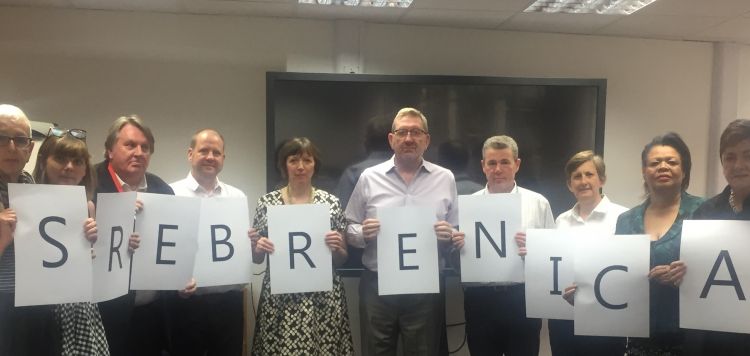Remembering Srebrenica

Today we’re marking the 23rd anniversary of Srebrenica genocide that took place in the Balkans in July 1995.
This year, the Remembering Srebrenica campaign is calling on people to expose and oppose hatred and bigotry.
The TUC is proud to support this campaign because, first and foremost, we’re all human beings – and genocide undermines the very idea of humanity.
But we’re also marking this terrible date because trade unionism is exactly the sort of non-denominational, non-racial, non-discriminatory institution that fights the divisiveness that leads to genocide.
We’ve demonstrated that all over the world and throughout our history – it is the essence of solidarity.
Fighting hatred and bigotry
The Remembering Srebrenica campaign also makes clear that genocide doesn’t happen overnight.
It takes years to persuade one group of people that another is so threatening – or different – that they deserve to die just because of who they are.
We support any effort to expose and oppose hatred and bigotry because fighting these evils is a necessary part of our existence.
Solidarity means recognising that, despite our differences, we have more in common than that which divides us, as Jo Cox put it.
And on a very practical level, solidarity requires that we represent all workers, members or otherwise.
We ensure that stronger groups of workers help the more vulnerable, and we promote the inclusion of every worker in our activity and democratic decision-making.
A history of tackling division
This is nothing new – trade unionists have always had to tackle attempts by employers and others to divide us on grounds of race, religion, gender and so on.
In Liverpool, Glasgow, and Northern Ireland in particular, unions had to overcome splits between Catholic and Protestant workers, just as US unions had to bridge racial divides in the south and attacks on Hispanic fruit-pickers in California .
In Iraq, the trade union movement has historically refused to distinguish between Sunni and Shia Muslims (and many other ethnic divisions that are less well known outside the country).
As Kenya struggled to gain independence from the UK, it was unions who brought different groups together to prevent (or hold back) the descent of Kenyan politics along tribal lines.
And in South Africa, unions played a key role in promoting non-racialism even under apartheid.
Building a better world
These are all examples of how trade unions helped to promote integration across political divides, helped to reduce the division and conflict that lead, ultimately, to horrors such as Srebrenica.
It may seem like a long way from the workplace to the Balkan killing fields.
But today, we should remember that workers’ solidarity is critical to building a world where genocide can never happen again.
Stay Updated
Want to hear about our latest news and blogs?
Sign up now to get it straight to your inbox
